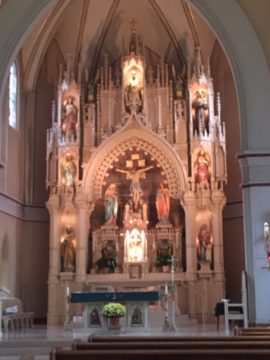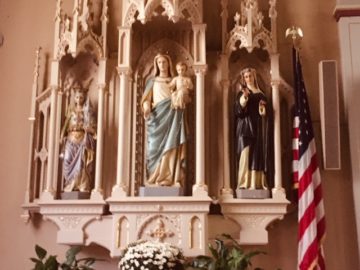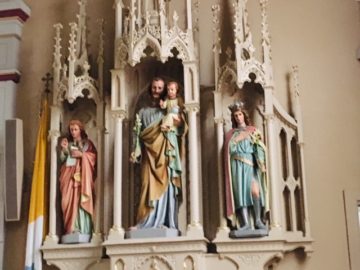As we continue searching for wisdom in the Gospel of St. Luke, we offer a Franciscan Gospel reflection and questions written by Fr. Paul Gallagher, OFM for your prayer. They are edited by Franciscan Sister of Christian Charity Sister Anne Marie Lom and Joe Thiel. The excerpts from the Sunday readings are prepared by Joe Thiel. To read or download the complete pdf with excerpts for your prayer, please click here: Franciscan Gospel Reflection September 29 2019. Excerpts are from the Lectionary for Mass for Use in the Dioceses of the United States of America, second typical edition © 2001, 1998, 1997, 1986, 1970 Confraternity of Christian Doctrine, Inc., Washington, DC. Used with permission. All rights reserved. No portion of this text may be reproduced by any means without permission in writing from the copyright owner. Photographs: St. Peter Church, Stevens Point, Wisconsin.
Luke 16:19-31
Jesus said to the Pharisees: “There was a rich man who dressed in purple garments and fine linen and dined sumptuously each day. And lying at his door was a poor man named Lazarus, covered with sores, who would gladly have eaten his fill of the scraps that fell from the rich man’s table. Dogs used to come and lick his sores.”
“When the poor man died, he was carried away by angels to the bosom of Abraham. The rich man also died and was buried, and from the netherworld, where he was in torment, he raised his eyes and saw Abraham far off and Lazarus at his side. And he cried out, ‘Father Abraham, have pity on me. Send Lazarus to dip the tip of his finger in the water and cool my tongue, for I am suffering torment in these flames.’
“Abraham replied, ‘My child, remember that you received what was good during your lifetime while Lazarus likewise received what was bad; but now he is comforted here, whereas you are tormented. Moreover, between us and you a great chasm is established to prevent anyone from crossing who might wish to go from our side to yours or from your side to ours.’
“He said, ‘Then I beg you, father, send him to my father’s house, for I have five brothers, so that he may warn them, lest they too come to this place of torment.’ But Abraham replied, ‘They have Moses and the prophets. Let them listen to them.’ He said, ‘Oh no, father Abraham, but if someone from the dead goes to them, then they will repent.’ Then Abraham said, ‘If they will not listen to Moses and the prophets, neither will they be persuaded if someone should rise from the dead.’”
Background:
In last week’s gospel, Jesus delivered the parable of the shrewd steward who reduced the debt of his master’s debtors. That gospel ends with Jesus telling the disciples “No servant can serve two masters. He will either hate one and love the other, or be devoted to one and despise the other. You cannot serve both God and Mammon.” (Luke 16:13) In the verses that follow that text, Luke records three short teachings of Jesus. Following those teachings, Jesus tells the parable of the rich man and Lazarus that is the gospel text for this week.
This week’s gospel comes out of a culture and values that are different from much of the western world. While globalization has made us much more aware of the limits of clean water and other resources, most westerners live without concern for limited resources when we shop for basic needs like apples or a new pair of shoes. Full closets and storage buildings speak of a culture that is very different from that represented in last week’s parable of the lost coin. This gospel comes out of a culture where supplies of food and other necessities of life were daily experienced as very limited. That experience also led to an understanding about those who had a surplus. Those who were in want also had responsibility to change their situation. Being a widow or an orphan were desperate situations, but neither was viewed as permanent. There was an understood obligation to help people to change their situation. Think of the seven brothers who married the same woman, for example. (Matthew 22:24-25)
There are aspects of this parable itself that are worth noting. The parable describes a reversal of roles. The two men live lives that could not be more opposite. When death comes, their statuses are still polar opposites, but they are now reversed. In the first part of the parable, Lazarus is described as lying at the gate of the rich man. He is not a leper, since he is permitted inside the city, but his condition is so dire that scavenger dogs lick at his sores. But he is not begging–he is not trying to change his situation, nor is he inviting the rich man to respond to his situation. He is ritually unclean, but more importantly, he is unclean in the reality of his existence. Lazarus’ state is totally deplorable. The rich man for his part is described as totally decadent. His house, his clothing, and his daily table are like those of an important feast. There is so much food that even the scraps that fall to the floor would be sufficient to satisfy Lazarus’ hunger.
Lazarus’s situation is so deplorable that people of the day might easily assume that his situation is the result of being cursed by God for sins that he or one of his ancestors has committed. The true reality is revealed in the second part of the parable. Both men are known to Abraham–they are both part of God’s chosen people. Both share in God’s covenant, and that covenant creates a relationship between them. But the rich man has ignored that relationship and its responsibility. The fact that he can name Lazarus (Luke 16:23) indicates that he recognizes him and is aware of his presence at his gate. In death, their positions are reversed, but the distance between them continues. “Moreover, between us and you a great chasm is established to prevent anyone from crossing who might wish to go from our side to yours or from your side to ours.” (Luke 16:26)
Reflection Questions:
1. How does my personal wealth or the lack of it affect my relationships with others?
2. What are some of the ways that my wealth and how I use it impact my relationship with God?
3. When I think of barriers between me and others, I feel…
4. Do you know people who are particularly good at forming relationships across barriers that might separate people? What about them seems to permit that to happen?
5. What is the most difficult barrier for you to cross in your relationships with others?
6. Do you believe that in the next life, those who have suffered in this world are more likely to find God’s favor?
7. In death, the rich man discovers his need for Lazarus. What are some of the things the rich man might have learned from Lazarus while he lived?
8. When you hear Abraham describe the great chasm that separates Lazarus and the rich man, what happens within you?
9. Can you take some time to talk with God honestly and simply about how wealth affects your relationships to other people, God, and even yourself, or about how you desire to use your wealth, and about what help you might need from God today?





